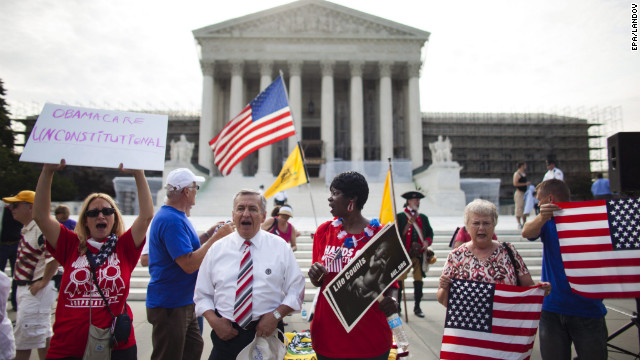First @CNN wrongly reports #SCOTUS "strikes down individual mandate." http://on.cnn.com/LvVRcK. Then decides to call itObamacare. Wow. #HCR

Supreme Court upholds entire health care law
Editor's note: We're live blogging from the Supreme Court today as the nation waits to see how the justices will rule on the health care law. You can follow along below as CNN Supreme Court Producer Bill Mears and Senior Legal Analyst Jeffrey Toobin get the latest details live from the court as well as analysis when the opinion is delivered. Watch live coverage and analysis on CNN TV, CNN’s mobile apps and http://cnn.com/live.
[Updated at 10:29 a.m. ET] House minority leader Nancy Pelosi has reacted to the ruling:
[Updated at 10:28 a.m. ET] In its 5-4 decision to uphold the U.S. health care law, the Supreme Court answered several key questions:
Question: Can the court decide the constitutionality of health care now, or does it have to wait a few years?
To answer, the court had to decide whether a penalty the law imposes on people who do not have health insurance amounts to a tax.
A previously obscure law mandated that the legality of a tax cannot be challenged until it is imposed, and the health care law doesn't call for penalties until 2014.
The court's answer: The court upheld the entire law.
Question: Is the requirement that people have health insurance - the so-called individual mandate - constitutional?
The court's answer: Chief Justice John Roberts wrote that the commerce clause did not apply, but the mandate stands under the taxing clause.
Question: If the individual mandate is unconstitutional, can the rest of the law stand, or is the whole thing unconstitutional?
The court's answer: The mandate is constitutional, rendering moot further questions on the rest of the law.
Question: Can the federal government force states to expand their share of Medicaid costs and administration?
The court's answer: Yes, but the justices ruled that the federal government cannot remove existing Medicaid funding if the states choose not to participate in the new program.
[Updated at 10:26 a.m. ET] Because the individual mandate has been upheld, and is essentially the funding behind everything else, this can be seen in large part as a major victory for President Obama, CNN Supreme Court Producer Bill Mears said.
Chief Justice John Roberts was the swing vote in the decision, Kate Bolduan reports, joining Ruth Bader Ginsburg, Stephen Breyer, Sonia Sotomayor and Elena Kagan.
[Updated at 10:22 a.m. ET] CNN's Kate Bolduan says that while the opinion upholds the healthcare plan, the opinion says the court “does not express any opinion on the wisdom of the Affordable Healthcare Act.”
That judgment is up to the people, according to the ruling.
The importance of the decision cannot be overstated: It will have an immediate and long-term impact on all Americans, both in how they get medicine and health care, and also in vast, yet-unknown areas of "commerce."
[Updated at 10:19 a.m. ET] Even though there's disagreement on the issue, the majority ruling is essentially saying it is up to the branches to work out the differences.
"When a court confronts an unconstitutional statue its endeavor must be to conserve, not destroy the legislation," Roberts wrote.
The decision is 110 pages, including the dissent, which was written together by Justices Scalia, Kennedy, Thomas and Alito.
A concurring opinion was written by Justice Ginsberg.
[Updated at 10:16 a.m. ET] Kate Bolduan reports that the Chief Justice John Roberts issued a long opinion in which he said the controversial individual mandate may be upheld and is within Congress’ power under the taxing clause rather than the commerce clause.






